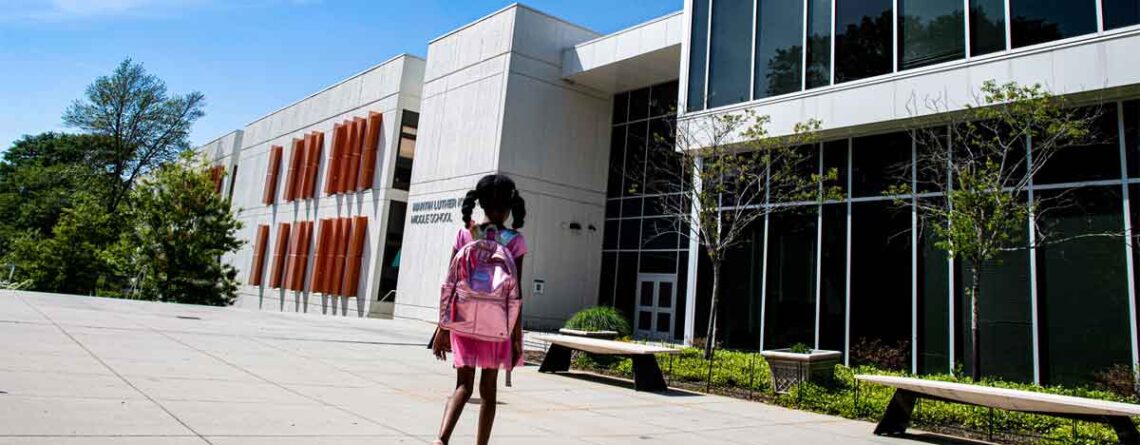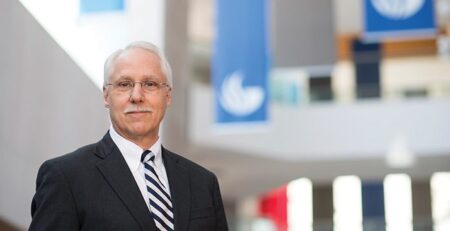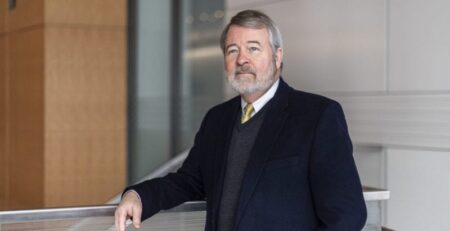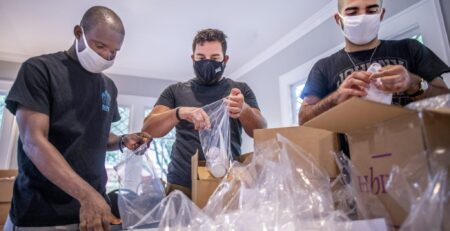Written by Sonam Vashi
Written by Sonam Vashi
 n his 16 years as a classroom teacher, most recently in North Atlanta, Ayodele Harrison had served on diversity committees, participated in affinity groups and worked with educators of many different races, ethnicities and genders.
n his 16 years as a classroom teacher, most recently in North Atlanta, Ayodele Harrison had served on diversity committees, participated in affinity groups and worked with educators of many different races, ethnicities and genders.
“Yet I had never really discussed my own racial identity and how it influences the way I show up in the classroom or heard them discuss their own racial identities,” he says.
That changed when in 2016 he joined the team at Collaboration and Reflection to Enhance Atlanta Teacher Effectiveness (CREATE). A teacher residency model that is a bridge from Georgia State University’s College of Education & Human Development to the Atlanta Public Schools (APS) system, CREATE offers instructional, emotional and mental support to fight inequities in education and sustain teachers in the profession. During the program’s work, Harrison, now the assistant director of CREATE, remembers sitting in groups with other educators, listening to peers frankly talk about how their own race, class, gender, upbringing and other factors affected the way hey communicated with colleagues, assessed children or viewed parents. It was the learning in public that struck Harrison.
“It makes it so that, okay, we are in the sauce together,” he says, “because we all have similar issues of being impacted by structural and institutional racism.”
With tens of millions of dollars in grant funding and partnerships with 15 schools in APS, CREATE’s model is focused on interrupting inequities in education by supporting teachers — particularly Black educators — through programming meant to strengthen teachers’ abilities to critically reflect on their own biases, engage in liberatory practices that disrupt the sources of inequity and develop understandings of systemic oppression and racist policies and practices deeply embedded in school culture . There’s also a deep focus on compassion for others along with self-care for educators. This work is all aimed at increasing teacher effectiveness and retention and allowing students in Atlanta to flourish.
“We’re not only teaching the outside of the teacher, supporting their instruction, we’re supporting the inside of the teacher as well,” says Rosalynne Duff, CREATE’s equity coordinator.
While Georgia State has developed a strong pipeline of teachers serving APS schools, associate professor of education Stephanie Behm Cross noticed a disconnect during a 2011 conversation with the then-director of the Atlanta Neighborhood Charter School (ANCS) in Grant Park. Sometimes, new teachers wouldn’t be fully prepared for the classroom, or there would be “a whole lot of important theory and historical framing that happens at the university, but not a lot of support to practice new ideas or ways of teaching out in schools,” Cross says.
Cross saw a need for a program that would allow schools and universities to learn from and with each other, one that focused on collective action and shared responsibility. The following year, she and a group of other education faculty started CREATE, a three-year teacher residency model. In the program, first-year student teachers receive training and mentoring from university faculty and experienced teachers. CREATE then continues to support residents for the following two years — their first years as certified teachers.
Another goal of the program is to reorient the educational ecosystem towards equity. That’s one reason why CREATE’s support also extends to the veteran educators at the program’s partner schools. Cross emphasizes the importance of creating a shared understanding of issues like racial equity among everyone in the school building.
“Unless there is a culture shift, unless everybody is willing to have hard, critical conversations about schooling, new teachers aren’t necessarily going to feel supported,” she says.
CREATE invites veteran teachers and principals at participating schools to attend several different multi-day or even year-long institutes focused on building that shared understanding. The group’s equity team also meets with principals to learn how to individualize different schools’ needs.
“I think there has to be shared learning about the overall purpose of schooling,” says Cross, “a shared understanding, so that we can fight together when we need to.”
Jacqueline Fawaz, an educator at Westside Atlanta Charter School, participated in one of the year-long veteran educator institutes, focused on supporting educators to become equity facilitator fellows in their schools.
“I’ve always thought of myself as enlightened in terms of my whiteness,” she says. “But it wasn’t until I really started doing this work with CREATE that I understood how much I still have to do.”
Through the program, she started a group focused on exploring whiteness at her school. Using CREATE’s methods, she says, “you push yourself more, because just like we say to kids in our classrooms, we try to create a safe environment so people can make mistakes.”
The program’s emphasis is on supporting the development of critically conscious, compassionate and skilled educators who are committed to staying in teaching and in Atlanta Public Schools in particular. To do that work, CREATE programming and initiatives aim to build and nurture a thriving community of educators — broadly defined and spanning schools, institutions and communities — who are committed to practices of teaching that prioritize racial justice and interrupt inequities.
One way that CREATE approaches this is through an emphasis on collaboration. For example, CREATE residents encounter a network of supports and collaborative learning opportunities within their cohorts. Unlike most teacher residency programs, which put second-year residents in a classroom on their own during their first year of certified teaching (after their first year as a student teacher), CREATE residents are paired together in the classroom. This peer-learning model means residents can share responsibilities with an equity-minded thought partner and are also afforded opportunities to step out of the classroom for continued professional learning and mentorship.
The three-year model is suited to addressing high teacher attrition rates at schools. Black teachers in particular have a higher turnover rate than white teachers — by about seven percentage points, according to national data — even though research shows students across all races, and Black students in particular, benefit from having Black educators.
“Often, teachers graduate from a preparatory program, and then they’re left on their own,” Cross says. “And the structure of many teacher preparatory programs, as well as the associated research focus, tends to be centered on the typical teacher demographic: white, middle class and female.”
Those programs might be more concerned with how a white teacher’s identity would matter in a predominantly Black classroom, for example. That’s important, Cross says, because “we know that white teachers can do a lot of damage” — like falling into a “savior” mentality — “if they don’t think about a lot of this carefully and deeply before they go into the classroom.”
“CREATE aims to differentiate for and center the needs of Black educators in particular, who are critical to Black students’ success,” says Cross. “Those needs might include figuring out how to politically navigate school spaces or interrogating more nuanced aspects of their identities.”
Surveys of student teachers at Georgia State have found that CREATE has a significant impact on recruiting and retaining Black educators.
In March 2020, the COVID-19 pandemic ground in-person teaching to a halt, throwing teachers and their students into the whirlwind of virtual learning. For many educators, especially newly minted teachers, navigating the technology, classroom management skills, quarantines and general uncertainty proved daunting. At the outset, CREATE doubled down on what it was already structured to do: be responsive to participants’ needs.
“We can’t get into the content before we know you’re emotionally well as a person,” says Cross.
CREATE’s focus on liberatory, compassion-based mindfulness practices for educators and its emphasis on teacher well-being has made the program well-suited to adapt to virtual instruction, according to Cross. Throughout the pandemic, Cross says she has witnessed CREATE instructional mentors communicating with residents weekly — even daily — to make sure they were well. In some cases, that also meant pausing instruction of the course content altogether and spending the majority of a 90-minute session just checking in with teachers.
“We have always been an organization that checks in on the individual teacher and educator first,” Cross continues. “How are you doing? How is your family? And I think it’s just even more so now during the pandemic.”
CREATE also supported residents this past summer and through the year as the murders of George Floyd, Breonna Taylor, Ahmaud Arbery and Rayshard Brooks ignited waves of protests. CREATE found their participants were overwhelmed but ready to engage in conversation and action.
“We’re right in the middle of Atlanta Public Schools, we teach Black and brown students, and we don’t know what to say,” the residents told CREATE instructors.
In response, CREATE concentrated on making space for teachers to process the events and learn from each other. As outlined in its mission statement, the program supports educators who are committed to practices that prioritize racial justice and interrupt inequities, and that means they must be ready to engage in deep conversation and take action around issues of equity and justice every single day.
As Harrison says, “CREATE was built for this.”
“Unless there is a culture shift, unless everybody is willing to have hard, critical conversations about schooling, new teachers aren’t necessarily going to feel supported.”
“Unless there is a culture shift, unless everybody is willing to have hard, critical conversations about schooling, new teachers aren’t necessarily going to feel supported.”
Already, the program’s work has shown signs of paying off. Surveys of student teachers at Georgia State have found that CREATE has a significant impact on recruiting and retaining Black educators, says Camea Davis, research assistant professor and director of qualitative research for CREATE in the Department of Middle and Secondary Education.
“That’s a huge implication for the city of Atlanta, but also for the nation, because broadly, the teacher workforce has a lack of teachers of color,” she says.
Now the research team is examining which aspects of CREATE are most impactful and finding ways to measure how it translates to students through several critical, longitudinal qualitative studies not typically included in teacher residency research. CREATE is unique in that it has a major research institution backing its work, says Davis, and the focus on both qualitative and quantitative research aimed at understanding the impact of this work on overall culture and educator experiences is sorely needed in the field, as evidenced by the program’s backing from the U.S. Department of Education, which recently awarded two different grants to CREATE totaling $13 million. One grant will extend CREATE programming and research for another two years. The other will allow CREATE to redesign and expand its work, developing deeper partnerships within APS as well as with the greater Atlanta community.
Through the latter grant, CREATE now offers more training and development for veteran educators and even parents — an example of the program’s commitment to fostering a shared understanding about racial justice and equity among all stakeholders of a school. It’s also focused on pulling in community groups like Project South, a local grassroots justice organization, to help develop a fuller notion of what equitable, collective learning might look like. This year, that will take the form of a multi-week summer institute for pre-service teachers, in which teachers, teacher educators and community members will partner in learning and activism focused on Black excellence and the history of Black teachers in Atlanta. The program also has introduced a new one-year residency model to accommodate more flexibility in the types of students who are able to participate.
The team is also doing critical qualitative work on CREATE’s culture and internal practices. Sometimes, addressing that culture might mean having difficult conversations and making adjustments, like acknowledging that CREATE is led by two white women — Cross and Elizabeth Hearn — and working to diversify the top levels of the organization.
“We’re learning how difficult it is to be an equity-centered organization from the top to the bottom — not just on what we give to our teachers, but in how we actually interact internally with each other,” Harrison says.
In 2019, the values that formed CREATE led to the establishment of the university’s Center for Equity and Justice in Teacher Education (CEJTE), a space to research and reimagine teacher education in Atlanta and beyond. (The center is closely linked to CREATE and its new grant, and the CREATE research team members also serve as the CEJTE directors.) The CEJTE hosts speakers and professional development with the aim of disseminating the practices and research that CREATE generates and connecting educators nationally and globally.
For Harrison, this work points toward empowering everyone involved in education — researchers, teachers, local organizers, principals, parents and students — and building community around their shared purpose.
“The goal is to engage in conversation, using the right tools — not to give people answers,” Harrison says. “It’s about making space for you to bring all of your lived experience, all of your knowledge, all your expertise to the table and interrogate it. Look at it. Question it. And then see other people do the same thing right next to you.”
Photos by Carolyn Richardson











Leave a Reply